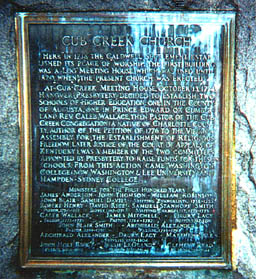
Cub Creek Settlement in Charlotte Co.

On old maps the creek is spelled Cubb Creek.
Here is Bailey Steppe's transcription of the plaque.
CUBCREEK CHURCH
Herein 1738 the Caldwell settlement established its place of worship. The first building was a log meeting house, which was used until 1820 when the present church was erected.
At Cub Creek meeting house, October 13, 1774, Hanover Presbytery decided to establish two schools of higher education, one in the county of Augusta, one in Prince Edward or Cumberland. Rev. Caleb Wallace, then pastor of the Cub Creekcongregation (A native of Charlotte County, author of the petition of 1776 to the Virginia Assembly for the establishment of religious freedom, later Justice of the court of appeals of Kentucky), was a member of the two committees appointed by the presbytery to raise funds for these schools. From this action came Washington College (now Washington and Lee University) and Hampden-Sydney College.
Ministers for the first hundred years
James Anderson. John Thomson. William Robinson. John Blair. Samuel Davies. Visiting evangelists 1738-1753. Robert Henry. David Rice. Samuel Stanhope Smith pastor1754-1767. Supply 1767-1771. visiting evangelist 1771-1773. Caleb Wallace. JamesMitchell. Drury Lacy pastor 1779-1781. ? pastor 1784-1787. Supply 1787-1789.John Blair Smith. Archibald Alexander pastor 1789-1991. ?pastor 1791-1794.Archibald Alexander. Drury Lacy. Mathew Lyle. Supply 1797-1804. John Holt Race.Nash LeGrand. Clement Read pastor 1807-1812.
The Caldwell Settlement
John Caldwell, born in Ireland, came to Pennsylvania 1727,died at Cub Creek 1750 and was buried here. Father of Rev. James Caldwell, heroof the revolution, grandfather of John Caldwell Calhoun, South Carolina Statesman.
In May 1738 John Caldwell in behalf of many families of our persuasion who are about to settle in the back parts of Virginia asked the synod of Philadelphia to appoint a committee to wait on the governor of Virginia with suitable instructions in order to procure the favor of governmentof that province to the laying of a foundation of our interest in that place, and to ask for the liberty of conscience and the privilege of worshipping God in a way agreeable to the principles of our education.
The governor granted this request and in 1738 a colony of Scotch-Irish Presbyterians under the leadership of John Caldwell purchased more than 30,000 acres along Cub Creek in this vicinity and established here a community of Presbyterian dissenters.